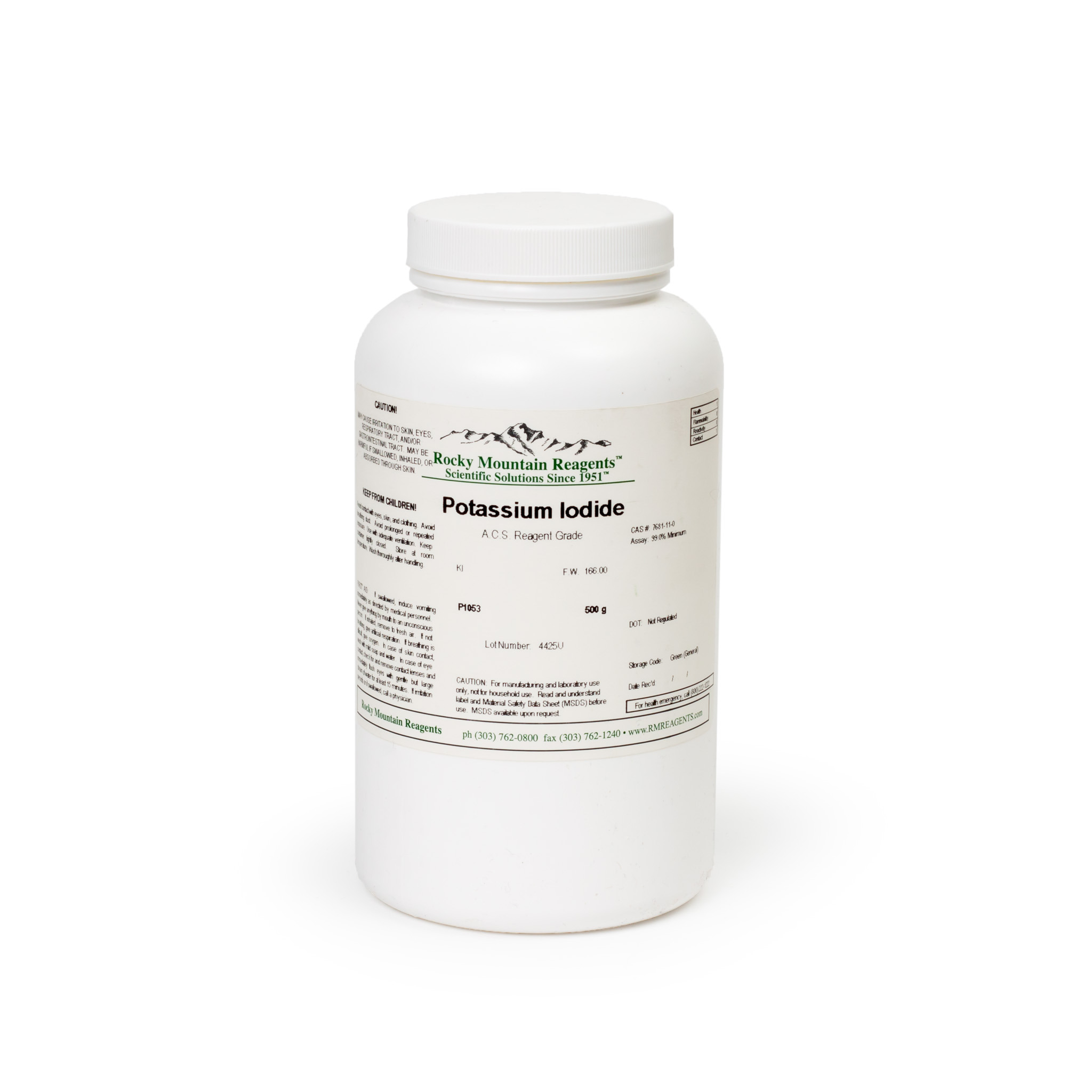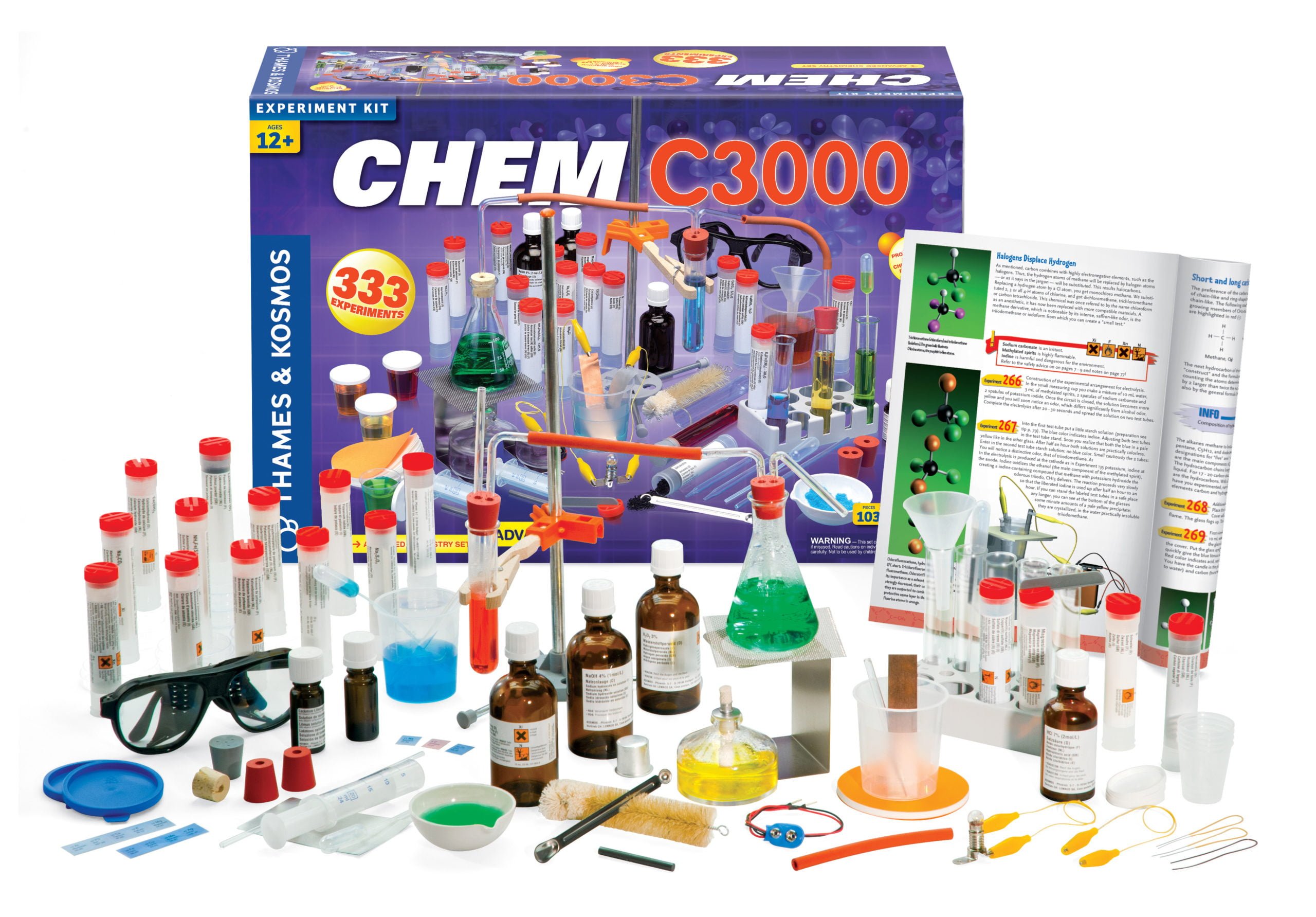
It is new and from AP Chemistry. Oxidizing agents (like potassium permanganate) or electrical current oxidize iodide to form iodine.Advanced Microchem Kit from quality science labs. In the anode beaker, the released iodine dissolves in the potassium iodide solution. The simultaneously-produced caustic potash (potassium hydroxide) solution, KOH, colors the red litmus strip blue.
Chem C3000 Potassium Iodide Skin Sporotrichosis And
Pure Potassium Iodide ACS LR AR Analytical Reagent FCC Food grade Manufacturers: Muby Chem Ltd. As a supplement it is used in those who have low intake of iodine in the diet. In the developing world it is also used to treat skin sporotrichosis and phycomycosis. As a medication it is used to treat hyperthyroidism, in radiation emergencies, and to protect the thyroid gland when certain types of radiopharmaceuticals are used. Potassium iodide is a chemical compound, medication, and dietary supplement. Lab Titles Lab 2 Mole Ratios.
Other side effects include allergic reactions, headache, goitre, and depression. With 10 being in new or excellent condition, this item is Common side effects include vomiting, diarrhea, abdominal pain, rash, and swelling of the salivary glands. Our rating system is as follows. Europe Africa Asia India Mumbai e-mail: infomubygroup.com Call +91-22-23774610Click an Image to Enlarge Mettler DL37 KF Coulometer Titrator Tester Analyzer Laboratory Equipment Model: DL37 Dimensions (LxWxH 16.514.259 As a large liquidator for many vendors.

For the latter, it is the most common additive used to "iodize" table salt (a public health measure to prevent iodine deficiency in populations that get little seafood). Medical uses Dietary supplement Potassium iodide is used as a nutritional supplement in animal feeds and also in the human diet. Potassium iodide is also used for the iodization of salt. Potassium iodide is available as a generic medication and over the counter.
Image is by MIBG scintigraphy with radiation from radioiodine in the MIBG. Thyroid protection Pheochromocytoma seen as dark sphere in center of the body. Dextrose or sodium thiosulfate are often added to iodized table salt to stabilize potassium iodide thus reducing loss of the volatile chemical. Potassium iod ate ( K I O 3) is used to add iodine to some salts so that the iodine is not lost by oxidation. The alkali metal iodide salt, over time and exposure to excess oxygen and carbon dioxide, slowly oxidizes to metal carbonate and elemental iodine, which then evaporates.

Chem C3000 Potassium Iodide Full Adult Dose
Nuclear accidents WHO recommended dose for radiological emergencies involving radioactive iodine Age70 kg ) should receive the full adult dose (130 mg) for maximal block of thyroid radioiodine uptake. Iodine-131 iobenguane used for therapeutic purposes requires a different pre-medication duration, beginning 24–48 hours prior to iobenguane injection and continuing 10–15 days following injection. Product labeling for diagnostic iodine-131 iobenguane recommends potassium iodide administration one day before injection and continuing 5 to 7 days following administration, in keeping with the much longer half-life of this isotope and its greater danger to the thyroid. Commercially available iobenguane is labeled with iodine-123, and product labeling recommends administration of potassium iodide 1 hour prior to administration of the radiopharmaceutical for all age groups, while the European Association of Nuclear Medicine recommends (for iobenguane labeled with either isotope), that potassium iodide administration begin one day prior to radiopharmaceutical administration, and continue until the day following the injection, with the exception of new-borns, who do not require potassium iodide doses following radiopharmaceutical injection. Not all sources are in agreement on the necessary duration of thyroid blockade, although agreement appears to have been reached about the necessity of blockade for both scintigraphic and therapeutic applications of iobenguane. However, some sources recommend alternative dosing regimens.
For protection of the thyroid against radioiodine (iodine-131) contamination, the convenient standard 130 mg KI pill is used, if available. Although the two forms of potassium iodide are completely interchangeable, normally in practice the SSKI solution, which is the historical medical form of high dose iodine, is generally used for all medical purposes save for radioiodine prophylaxis. This is not the same as blocking the thyroid's release of thyroid hormone, for which the adult dose is different (and is actually higher by a factor of 7 or 8 ), and for which KI anti-radiation pills (not a common medical treatment form of KI) are not usually available in pharmacies, or normally used in hospitals, or by physicians.
The anti-radioiodine doses used for 131Uptake blockade are lower, and range downward from 100 mg a day for an adult, to less than this for children (see table). A saturated solution of KI (SSKI) is typically given orally in adult doses several times a day (5 drops of SSKI assumed to be 1⁄ 3 mL) for thyroid blockade (to prevent the thyroid from excreting thyroid hormone) and occasionally this dose is also used, when iodide is used as an expectorant (the total dose is about one gram KI per day for an adult). There have been some reports of potassium iodide treatment causing swelling of the parotid gland (one of the three glands that secrete saliva), due to its stimulatory effects on saliva production. Potassium iodide is also not recommended for people with dermatitis herpetiformis and hypocomplementemic vasculitis – conditions that are linked to a risk of iodine sensitivity. It can also cause sialadenitis (an inflammation of the salivary gland), gastrointestinal disturbances, and rashes. Side effects There is reason for caution with prescribing the ingestion of high doses of potassium iodide and iodate, as their unnecessary use can cause conditions such as the Jod-Basedow phenomena, trigger and/or worsen hyperthyroidism and hypothyroidism, and then cause temporary or even permanent thyroid conditions.

Potassium iodide is a possible teratogen.


 0 kommentar(er)
0 kommentar(er)
